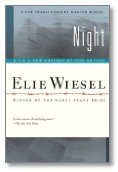 A few months back I finished reading Night by Elie Wiesel. From Wikipedia:
A few months back I finished reading Night by Elie Wiesel. From Wikipedia:
Night is a work by Elie Wiesel based on his experience as a young Orthodox Jew of being sent with his family to the German concentration camps at Auschwitz and Buchenwald during the Second World War.
Wiesel was 16 years old when Buchenwald was liberated in April 1945. Having lost his faith in God and humanity, he vowed not to speak of his experiences for ten years, at the end of which he wrote his story in Yiddish, which was published in Buenos Aires in 1955. In May that year, the French novelist François Mauriac persuaded him to write the story for a wider audience. Fifty years later, the 109-page volume, described as devastating in its simplicity, ranks alongside Primo Levi's If This Is a Man and Anne Frank's The Diary of a Young Girl as one of the bedrocks of Holocaust literature.
Back in August Wiesel spoke at an event in honor of Rochester College's 50th anniversary (link). We were hoping to attend, but it turned out we had a previously-scheduled camping trip that conflicted. It was a rather amazing book to read…so hard to imagine that it could have happened or what it would have been like to endure. One of the most amazing parts to me was the death march (again from Wikipedia):
In or around August 1944, Eliezer and Shlomo are transferred from Auschwitz II-Birkenau to Auschwitz III, the work camp at Buna-Monowitz, their lives reduced to the avoidance of violence and the constant search for food. "Bread, soup - these were my whole life. I was a body. Perhaps less than that even: a starved stomach." The only time they experience joy is when the Americans bomb the camp. "[W]e were no longer afraid of death; at any rate, not of that death. Every bomb that exploded filled us with joy and gave us new confidence in life."
In January 1945, with the Soviet army approaching, the Germans decide to flee the camp, taking around 60,000 inmates, mostly Jews, to camps in Germany, on what becomes known as the death marches, shooting anyone too weak to continue. Eliezer and Shlomo march to Gleiwitz to be put on a freight train to Buchenwald, near Weimar.
An icy wind blew in violent gusts. But we marched without faltering.
Pitch darkness. Every now and then, an explosion in the night. They had orders to fire on any who could not keep up. Their fingers on the triggers, they did not deprive themselves of this pleasure. If one of us had stopped for a second, a sharp shot finished off another filthy son of a bitch.
Near me, men were collapsing in the dirty snow. Shots.